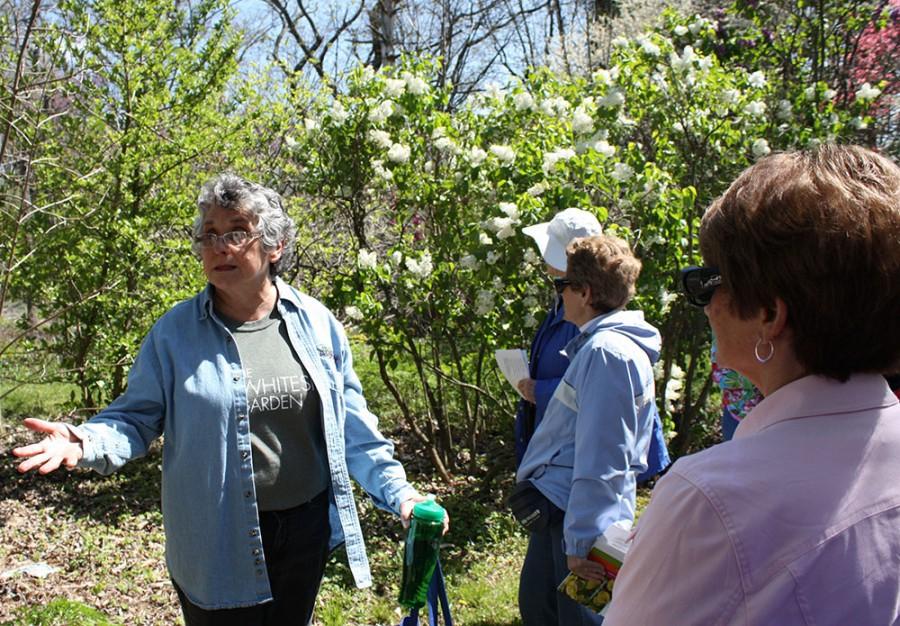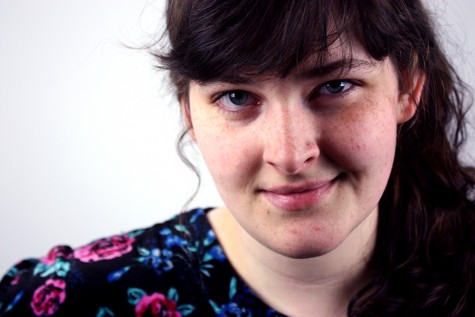Local garden shines amidst difficulties
Nancy Coutant, retired Eastern biology professor, leads a tour at the Whiteside Gardens in Charleston
April 27, 2015
As a relatively hidden gem of the area, Charleston’s Whiteside Gardens continues to grow, despite a number of mounting struggles that the garden faces.
Wesley Whiteside started Whiteside Garden in 1960, turning five acres of farmland into the impressive botanical garden that it is today.
Since Whiteside’s retirement as an Eastern professor in the botany department in 1987, the garden has expanded and enticed many visitors to view the eclectic collection of plants gathered there.
During a tour that took place in the garden Monday afternoon, 14 attendees took in a wide variety of plants from all over the world.
The massive collection of plants seemed to captivate the group, as a diverse sea of purple, red, green, pink, white, blue and yellow flowers sprouted up from the earth to greet the visitors.
Nancy Coutant, the group’s tour guide, led a tour through the winding paths and over the wooden bridges of the Whiteside Gardens, picking out plants along the way and providing information on many of them.
“(Whiteside Garden) is a real treasure,” she said. “Its just an amazing, amazing place.”
For an hour and a half, the attendees enjoyed the weather and discussed the impressive amount of plants that surrounded them.
Mattoon residents Jack and Jan Little said they appreciated the tour, and were both glad to see “the awakening” of the plants during the springtime.
“Our friends always told us that tours at (Whiteside Gardens) are great and we decided that we weren’t going to miss it this time,” Jan Little said.
“It’s really beautiful out here,” Jack Little said. “We didn’t know what to expect.”
After visiting several of Whiteside Garden’s more popular attractions, such as the rare ”Ben Franklin Trees,” Coutant took the tour to the back of Whiteside’s house, which is in the middle of the area. She showed the group one incident the garden recently encountered.
A massive dawn redwood tree, which she said was once around 40 feet tall, has been reduced to splinters by lightning from a storm that happened a couple of weeks ago.
As the tour continued, the visitors experienced what Coutant described as “one of the largest magnolia collections in the Midwest,” along with hundreds of variations of lilies and hundreds of other plants Whiteside has planted over the years.
In dealing with the issue of 87-year-old Whiteside’s health declining over the last few years, the garden has struggled to maintain and preserve all of Whiteside’s work.
Coutant said several of Whiteside’s unusual methods for treating and growing some of the garden’s plants were not properly documented and may become lost to its staff and volunteers.
Coutant is also a recently retired Eastern biological sciences professor, as well as a former student of Whiteside’s who helped develop her interest in botany. She said she was a major part of a deal between Whiteside and President Bill Perry that occurred several years ago states that in the event of Whiteside’s death the university will inherit the garden.
Through generous donations from a couple of Whiteside Garden’s biggest admirers, as well as smaller donations from area residents, Coutant said the garden will continue to grow and hopes the Charleston community will become more involved with the garden as well.
As far as documenting all of the Garden’s plants, Coutant said that around 500 plants have been documented over the last four years, with an estimated 1,000 plants in the garden still needing to be documented.
The tour consisted entirely of participants from the Academy of Lifelong Learning program, which offers non-credit learning opportunities for adults of all ages. Marita Metzke, a coordinator for the program, said events like a tour of Whiteside Garden are what the academy is all about.
“We look for opportunities to partner with the community and to find ways to learn and socialize,” she said.
Metzke, who enjoys gardening in her free time, said she also appreciated Whiteside Garden as a massive collection of plants native to Illinois and other countries all over the world.
“I figured that I could come here and learn something,” Metzke said. “I found a lot of plants here that I would like to try in my yard.”
Derrin Coad can be reached at 581-2812 or at dkcoad@eiu.edu.





































































